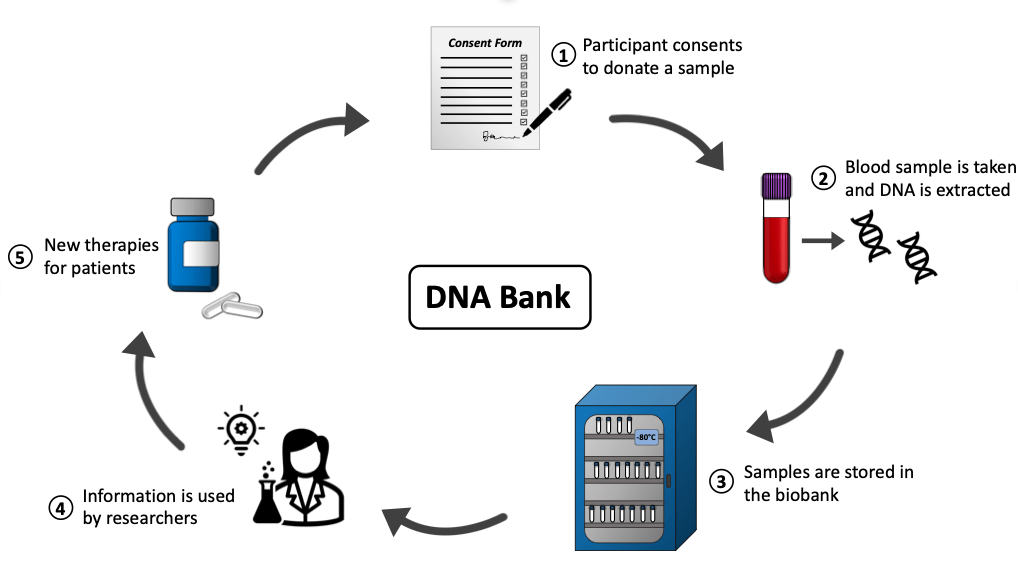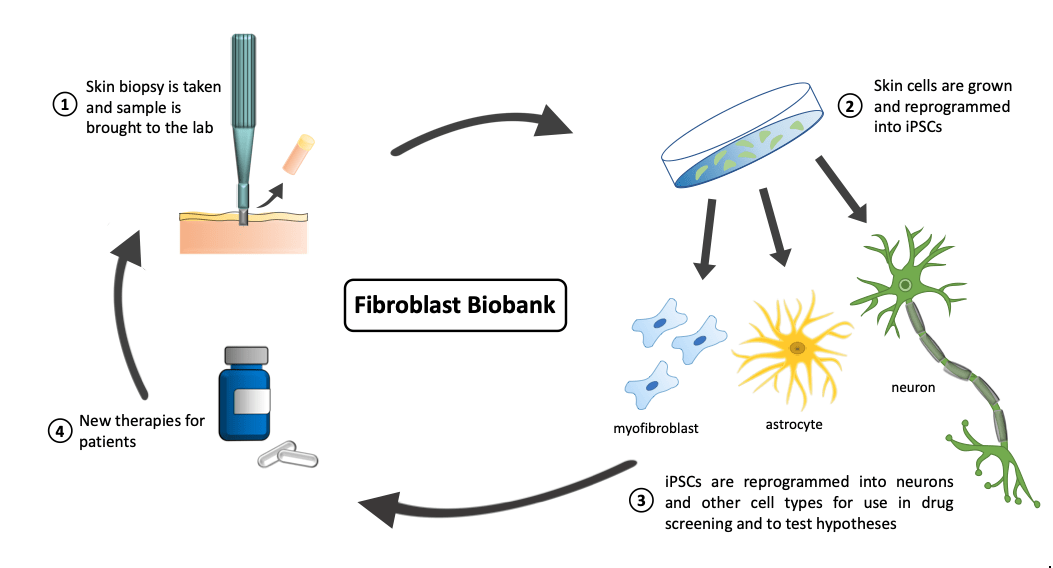Biobank
What is a biobank?
Biobanks are a collection of biological samples. Different types of samples including blood, urine, skin biopsies and associated clinical information are collected and stored usually indefinitely for use in research. Biobanks can have a specific purpose, for example, collecting samples from people affected by a particular disease, or they can be population-based. They are an invaluable resource for scientists because they streamline the patient recruitment process by providing a large collection of samples all in one place.
This allows for higher quality research to be conducted more quickly.
We are currently operating two biobanks in Trinity College Dublin. Click below for more information.
DNA Bank
DNA Bank
The set of instructions for how to make a human is known as a person’s genome. These instructions are made up of deoxyribonucleic acid, or DNA. DNA is made up of smaller molecules called nucleotides. There are only 4 different nucleotides called adenine (A), thymine (T), guanine (G) and cytosine (C). These nucleotides bind together in different sequences to form all the genes in our genome. There can be minor errors in these sequences, known as genetic mutations. Usually, these mutations do not cause any problems, but sometimes, mutations can occur in specific genes known to play a role in disease. It is likely that genetic mutations play a prominent role in ALS/MND. Many of these mutations have been identified, however, only approximately 10% of cases of ALS/MND in Ireland can be explained by known mutations. Therefore, many more mutations remain to be discovered.
DNA banks are vital to learning more about the genetics of ALS/MND. Our DNA bank now contains more than 1500 samples collected over the past three decades. We collect blood samples from people with ALS/MND, family members and controls (people unaffected by ALS/MND). DNA is then extracted from these samples and stored in the DNA bank.

Overview of How Our DNA Bank Works
Our DNA bank allows us to be involved in several projects investigating the underlying genetic causes of ALS/MND. Click on the ‘Genetics’ and ‘Epidemiology’ tabs current research section for further information
How To Get Involved:
If you are interested in donating a sample to the DNA bank, contact:
- Gráinne Geoghegan, FutureNeuro Biobanking Research Assistant (grainne.geoghegan@tcd.ie)
- Colm Peelo, PhD Candidate (colmpeelo@beaumont.ie /peeloc@tcd.ie)
- Mark Heverin, Research Manager to Prof. Hardiman (mark.heverin@tcd.ie)
Fibroblast Biobank
Fibroblast Biobank
The mechanisms of how and why nerve cells malfunction is not well understood. Studying diseases in the central nervous system is particularly difficult because obtaining samples of living nerve cells is usually not possible without performing an operation. To overcome this problem, Professor Orla Hardiman’s group in Trinity College Dublin and Beaumont Hospital is setting up a new fibroblast biobank with funding from FutureNeuro, the Science Foundation Ireland Research Centre for Chronic and Rare Neurological diseases and in collaboration with researchers in NUIG, RCSI and the University of Sheffield.
The purpose of this biobank is to collect skin and blood samples from people with specific neurological diseases (ALS/MND, Frontotemporal Dementia and Huntington’s Disease), family members and controls (people unaffected by neurological diseases) and establish a repository of samples that we can use in further studies to help us better understand the condition.
A small piece of skin, smaller than the top of a pencil (4 mm) is taken from a numbed area on the inner forearm using a circular ‘punch’ blade and heals without a scar. The biopsy is then taken to the lab where researchers grow fibroblasts (skin cells) from it, which are then ready to be stored in the biobank. Using induced pluripotent stem cell (iPSC) technology, scientists can take these cells and transform them into neurons, or other cell types found in the brain which are also involved in ALS/MND disease progression. These unique cells will be used in future research projects involved in the understanding and treatment of ALS/MND. Blood samples are also taken from participants and processed to look for proteins and other constituents that may provide clues about the disease. These samples will be retained indefinitely in the biobank and will be used in future research involving the development of personalised medicine approaches towards new therapeutics for neurological diseases.

Overview of How Our Fibroblast Biobank Works
Click here to find out more about the use of iPSC technology in ALS/MND research, and why it is so important.
How To Get Involved:
If you are interested in donating a sample to the biobank, contact:
- Gráinne Geoghegan, FutureNeuro Biobanking Research Assistant (grainne.geoghegan@tcd.ie)
- Mark Heverin, Research Manager to Prof. Hardiman (mark.heverin@tcd.ie)
Fibroblast Biobank Privacy Policy